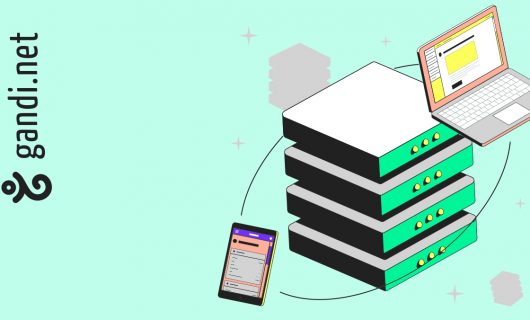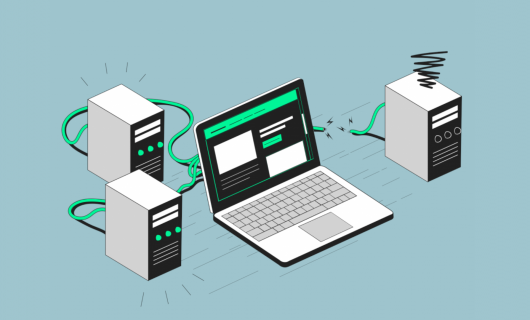Self-hosting is a practice that consists of hosting internet services on your own machines (as opposed to using hosting services from a third party). In most cases practiced by companies, self-hosting is also of interest to individuals who want to maintain control over their data. For example, it’s possible to self-host a blog on a machine that you control rather than at a datacenter. Yunohost is an operating system that helps you with administering a self-hosted server as easily as possible. Its goal, then, is to make self-hosting available to all, while also ensure that it’s safe, secure, ethical, and technically lightweight.
Why self-host?
Self-host to decentralize the internet
Mass surveillance by private and governmental organizations, political censure, centralization of information and services by internet giants like Google and Facebook, loss of trust in the management of personal data—the dark horizons are many in today’s global web landscape.
Still, the main purpose of the internet is to be a place of freedom and openness. Freedom online starts with the principle “I will do it and I will make it available to others.” This philosophy run counter to any interference but also to any deprivation.
Self-host to maintain control over your data
Your photos, your electronic communications, your web browsing history should all belong exclusively to you as well as those with whom you are directly communicating, and should not feed a monetisable database. However, self-hosting is not necessarily synonymous with ultra-privacy, and much less with anonymity. The goal of self-hosting is to provide a higher degree of autonomy and control over services and data. Operating your own server means that that person makes the choice of who is responsible for their data. It requires, then, implementing a coherent backup and update strategy. No third party will be able to help you gain access to lost data.
Self-host to customize your online space
When you self-host your own server, so long as you’re comfortable with command lines, network configurations, and DNS settings, you can manually install and manage any software and customize every aspect. You can immerse yourself in all the underlying mechanisms of operating systems and the internet.
Why choose Yunohost?
Yunohost is an operating system that was created in 2012, and which aims to simplify as much as possible the administration of a server as well as bring self-hosting to the masses. Its name is a play on the internet slang “Y U NO Host” which means, more or less, “Why don’t you host?” It’s a free software project maintained exclusively by volunteers interestedin making a more open and decentralized internet.
Yunohost’s features:
- distribution based on Debian GNU/Linux
- administration via a simple web interface
- deploy applications in just a few clicks
- configure domain names (Gandi, of course, is supported)
- manage TLS/SSL certificates (based on Let’s Encrypt)
- backup system
- comprehensive mail server (Postfix, Dovecot, Rspamd, DKIM)
- instant messaging server (XMPP)
- security systems (Fail2Ban, yunohost-firewall)
Get started with Yunohost
Self-hosting requires having a server
Contrary to what you might think, a sever is not necessarily a huge, all-powerful machine: a small, $30 ARM card is sufficient for self-hosting. To go further, you can choose to self-host behind a VPN or on a VPS.
Yunohost self-hosting on an ARM card
You can self-host yourself, at home, with an ARM card or on an old computer, connected to your modem.
Advantages:
- physical control over your machine
- only need to buy the initial equipment
- or even reuse equipment you already have
Disadvantages:
- manual configuration of your internet setup
- possibly limited by certain aspects of your internet service provider (which you may be able to get around using a VPN)
- you cover electricity costs (sometimes difficult to precisely define if they are included with your general home electricity)
- you cover maintenance costs on the machine itself
Yunohost self-hosting behind a VPN
In order to make self-hosting easier and to get around restrictions by some large providers (dynamic IP and SMTP port blocked), the “internet cube” https://internetcu.be/, for example, is a little machine that comes with Yunohost pre-installed and configured to use a VPN.
This VPN enables you to get a fixed IP address (with an unfiltered SMTP port), generally through a non-profit operator affiliated with the FFDN (Fédération des fournisseurs d’acces à internet associatifs, or the Federation of non-profit internet service providers).
A VPN is an encrypted tunnel between two machines. In practice, this makes it possible to make it “as if” a machine is connected to the internet elsewhere. This makes self-hosting at home posible while working around limitations imposed by internet service providers and protecting the traffic to your machine from eavesdropping.
Advantages:
- physical control over the machine
- a VPN makes it possible to keep traffic hidden from your ISP
- a VPN enables you to work around limitations imposed by your ISP
Disadvantages:
- monthly fees for VPN use
- you cover electricity costs
Yunohost self-hosting on a VPS
It’s also possible to rent a virtual private server or a machine dedicated to non-profit or commercial web hosts. This option is much easier for the user.
Advantages:
- quick server
- good internet connectivity
- you will no longer need to worry about physical upkeep of your server, or the noise and heat created by hosting a server at home
- depending on your provider, ome features may be able to make your life easier, such as snapshots, which let you return to a previous state in case you run into a problem (following major upgrades, for example) or even increasing the size of a volume if you exceed the storage space requirements initally expected
Disadvantages:
- monthly fees for the machine
- no physical control over the server
You can host for your friends, family, or your business problem free, but you should have faith in your users, and vice versa.
If you want to provide YunoHost services to others, a separate VPS per user will be the best option.
Tagged in Cloud



